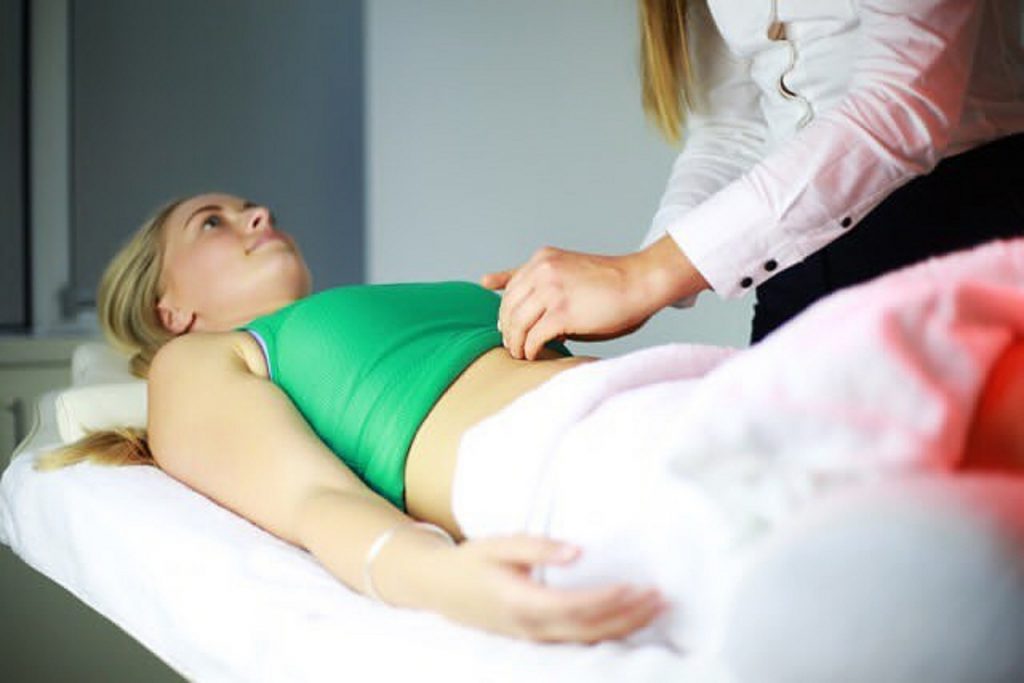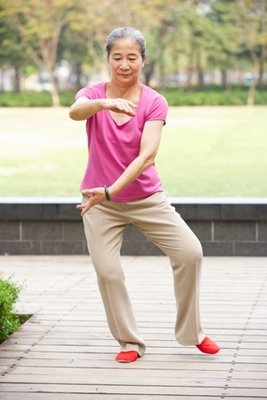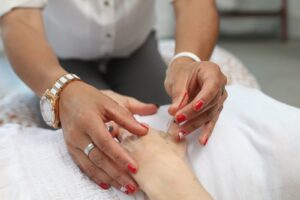Subscribe to the Newsletter
If you are interested in understanding how Traditional Chinese Medicine can improve your life sign up to my newsletter for the latest updates.

… and that’s both in acute and chronic conditions. (Of course, it’s also often been used for anaesthesia, before operations.)
In the past, Western doctors mostly used acupuncture only for pain relief.
They thought of acupuncture as just another way to remove pain when pills didn’t work for long enough.
Or when they’d run out of ideas!
What’s more, they thought the way to do it was by sticking a needle in where it hurts, as if they were using a hypodermic syringe to inject a painkiller.
However, more and more Western-trained doctors are beginning to realise that 2500 years of acupuncture pain experience in China and elsewhere just may have something to offer.
Not only that, but some of the brightest and most observant doctors the world has even seen have left us a substantial written legacy of their thoughts, ideas, suggestions and formulae.
What did all those thinkers have to say about acupuncture pain?
On my way to China in 1982 I sat in with a Chinese doctor in Hong Kong. We hardly spoke any of each other’s language so I learned plenty about sign language – not least because he had quite a few Europeans as patients and very few of them spoke any Chinese either.

He communicated by sign language and drawing pictures. Also he was most observant: he used his eyes, his sense of smell, his ears and his assessment of their emotional makeup.
Then of course he also used his sense of touch, not only palpating where patients showed him it hurt, but also by taking their pulses the Chinese way. He also looked at their tongues.
From this he was usually able to treat them very successfully. He used acupuncture, acupressure, herbs and suggestions for diet. I was very impressed and learned a lot by seeing how with acupuncture pain was relieved, often within a minute.
He invited me, unexpectedly, to have a meal with him and his colleagues. (I was extremely honoured.)
At the dinner, one of the doctors who spoke good English asked me to explain what I thought an English doctor might suggest for a throbbing headache, worse for touch and if lying down. I said perhaps an aspirin. (At that time, there was little knowledge of the dangers of aspirin.)
My suggestion was duly translated into Chinese and passed round the table – there were perhaps a dozen doctors there.
Then he asked me what I thought an English doctor might prescribe for backache, worse for standing, better for lying down. I said, well – perhaps an aspirin.

This was duly passed round. It provoked some raised eyebrows.
Then one of the doctors asked me, via the interpreting doctor, what English doctors would prescribe for a painful bruise. I had no idea what most doctors would prescribe but I knew my own family’s doctor had once prescribed aspirin.
Now some of them began to shake a little: they were much too polite to laugh out loud.
What would an English doctor prescribe for tired, aching eyes?

Aspirin. (OK! the picture is of Paracetamol, but the principle applies all the same. We didn’t have any aspirin in the house when I took the picture!)
Now they couldn’t control themselves. They began to cry with laughter. My English-speaking doctor sent his colleagues fierce looks: he was most apologetic.
Because each of these conditions is completely different in Chinese medicine and whether using herbs, diet, or acupuncture pain would receive completely unique treatment.
They were gently pulling my leg, of course. They knew perfectly well what aspirin did.
But they couldn’t understand how in Western medicine a doctor could responsibly prescribe the same drug for so many different kinds of pain when each required its own individualised kind of treatment.
Taking those pains in order, what might the diagnosis in Chinese medicine? And the appropriate treatment?

A throbbing head pain, worse for touch or lying down, indicates almost certainly an excess yang situation, requiring treatment that sends yang down the body from the head. There are various ways of doing this.
Backache worse if standing, better after lying down for a while? This is a deficiency situation of Qi, often mainly of Kidney qi. Treatment should strengthen that energy.
A painful bruise indicates stagnation of blood: treatment is aimed to move the blood and nourish the tissues.
‘Tired, aching’ is also a deficiency situation, mainly of what is called Liver Blood but also of Qi: Qi deficiency tiredness.
Admittedly an aspirin might ease the pain in all these but only in one case does it actually address the real cause of the problem.
In all the other cases, aspirin would hide the cause of the pain, leading the patient perhaps to overtire himself, worsening the problem.
Long-term, however, non-steroidal anti-inflammatory drugs (NSAIDS) like aspirin and ibuprofen are not recommended for pain (ie chronic pain). Why? Because they prevent your body producing the white blood cells it needs to initiate its own anti-inflammatory response which then triggers the next stage of repair.
So if there’s no repair, the pain continues, becoming even more chronic. In effect, by preventing your white blood cells from taking action leading to repair, you continue with your acute pain condition. Indefinitely.
For more on this click on Sci Transl Med, 2022; 14(644): eabj9954
This ‘ban’ by NICE (the UK’s National Institute for Care and Excellence) also applies to other drugs like acetaminophen (= paracetamol eg Panadol and Tylenol) opioids and steroids.
So what DO they suggest fro chronic pain?
Instead they suggest group exercise programmes, psychological help – and acupuncture! (NICE draft clinical guidelines, August 3, 2020)
Just to repeat that in case your eyes glazed over, can painkillers actually cause long-term pain?
Well, research (Sci Transl Med, 2022; 14(644): eabj9954) shows that painkillers like NSAIDs, although they give quick relief, can lead to more chronic pain by interfering with the body’s inflammatory response, which when not otherwise burdened by the NSAID hastens damaged tissue repair.
In effect, the painkillers blocked the spread of neutrophils (white blood cells that start inflammation that leads on to the healing process) so retarding healing, leading to longer dependence on painkillers.
The opposite of what you wanted!
In addition, researchers found that many hundreds of thousands of patients were still taking painkillers between two and ten years after commencing painkillers for the original problem! (WDDTY July/August 2022, p13).
What can we learn from this?
There are three very different situations as regards pain.
1. Too much energy – Qi – or Blood: an excess. (Read more about Excess or Deficient here.) This leads usually to signs of heat, pressure, throbbing and dislike of touch. This is like a flooding river forcing back flood defences. This is like many headaches (but although acupuncture may greatly help, there are some kinds of severe headache where you should see a doctor FAST.)

2. Too little Qi or Blood: deficiency, possibly from over-work, not eating or not absorbing enough good food, over-tiredness or lack of sleep. This is like a river in a drought, where the fish are marooned in puddles in the river-bed.
What is needed is rest, nourishment and time, so that the body may recover. Acupuncture helps too! (Click here for appointments with the author near Edinburgh: for elsewhere, click on BAcC.)

3. Invasion by an external pathogen – a bug – leading to malaise and pain (which might be excess or deficiency type.) This is like a river polluted with offensive matter.

Taking that analogy a bit further. The Chinese medical tradition believes in what are called acupuncture meridians or ‘channels’. These are like rivers carrying energy and nourishment throughout the body.
If a problem occurs at one point along a river it makes sense to adjust the flow in the entire river as well as perhaps to deal with the problem locally. If you have an excess yang situation, you should adjust the flow of the river from one of its main acupuncture pain control points, which may be some distance from the pain.
In a deficiency situation, the problem will recur unless something is done about the cause of the deficiency.
Treating this gets to the heart of the matter, and the acupuncture points that do it may be far from where it hurts.

If you have a deficient kind of pain, it will usually improve after rest or sleep, and often you will like the feeling of pressure or gentle massage or rubbing where it hurts, or even all over you, and warmth.
In an invasion from outside (from an ‘external pathogenic factor’), the river system must be cleansed: use appropriate acupuncture pain control points.
Usually, but not always, the best way to treat pain with acupuncture is to consider the underlying condition, treat that and then supplement it with acupuncture pain points near, but more often distal, to the site of the pain.
So, having found on which acupuncture channel(s) the pain lies, use points further along that channel to control the flow of energy in it. Which points? Maybe one of the five-back-shu points. Then, if appropriate, use local acupuncture pain control points.
So … Simple? Not necessarily.
There are other, channel-based (eg Dr Tan or the Balance system; Master Tung; Japanese acupuncture), systems of acupuncture that the author of this site uses when treating pain. For these, acupuncture point location is usually very important. Usually he can reduce pain from 100% to under 20% in one treatment, though further treatments may be necessary to consolidate this.
With these systems, you treat the ‘healthy’ side, which then works to repair the ‘unhealthy’ or painful side. (Seems crazy? But it works – sometimes within seconds!)
And ear acupuncture is also very effective, as is abdominal acupuncture, in which he is also trained. (If you don’t like the sound of that, well, it’s almost painless!)

You certainly can!
And the general rule in Chinese medicine theory for acupuncturists is to clear the excess and then treat the deficiency. For instance, in cases of pain caused by Qi stagnation, there is very often an excess (being the distending, bursting pain, sometimes burning too) and the underlying exhaustion which adverse circumstances have caused.
It’s a common situation which everyone experiences from time to time. I received so many questions about it that eventually I wrote a book about it – see also below.
For more on this, click Excess and Deficiency.
For a long time, Western authorities (represented on committees by many Western-trained doctors and scientists) thought very little of acupuncture pain relief. I met doctors who, when I questioned their views on acupuncture, got up and walked away! (Not all doctors, of course! Some had very positive personal experiences of receiving acupuncture and often recommended it.)
Now, suddenly it seems, there is a change in the air.
NICE (the UK National Institute for Health and Care Excellence) has once again trawled the research and seems, according to WDDTY, to be edging towards recommending acupuncture for chronic pain over standard painkillers since none of them ‘is effective, including paracetamol, NSAIDs (non-steroidal, anti-inflammatory drugs), benzodiazepines and opioids’.
Reference: https://www.wddty.com/news/2020/09/acupuncture-treats-pain-better-than-opioids.html
and their source document –
the NICE consultative paper: https://www.nice.org.uk/guidance/indevelopment/gid-ng10069/consultation/html-content-2
Here’s another source, specifically on back pain:
https://www.wddty.com/news/2007/09/back-pain-acupuncture-is-the-best-thing-you-can-do.html
For some kinds of pain, especially if caused by Qi Stagnation, exercise is hugely beneficial. Even the UK NHS now recognises this, see their guide to Tai Chi!

Tai Chi is an ancient way to keep body and mind healthy, used by millions of Chinese for millennia. Even today, if you go out into their city parks before dawn, you’ll find hundreds of Chinese people quietly practising it together.
Nowadays in the West, we are lucky to have many accomplished practitioners to teach it.

Stay in Touch!
No spam, only notifications about new articles and updates.

Book a Video consultation if you want to know more about your symptoms

This Introductory Chinese medicine course introduces you to the amazing thinking behind this ancient medicine, now increasingly in demand.

The Scottish College for Chinese medicine provides introductory courses for all, explaining Chinese medicine and its cultural background.

Master Tung’s acupuncture is a hidden treasure, lost to China but recovered in Taiwan from where it spread round the world.

Knee pain has five main causes. It’s certainly worth trying acupuncture before you resort to surgery!
Subscribe to the Newsletter
If you are interested in understanding how Traditional Chinese Medicine can improve your life sign up to my newsletter for the latest updates.
Subscribe to the Newsletter
If you are interested in understanding how Traditional Chinese Medicine can improve your life sign up to my newsletter for the latest updates.